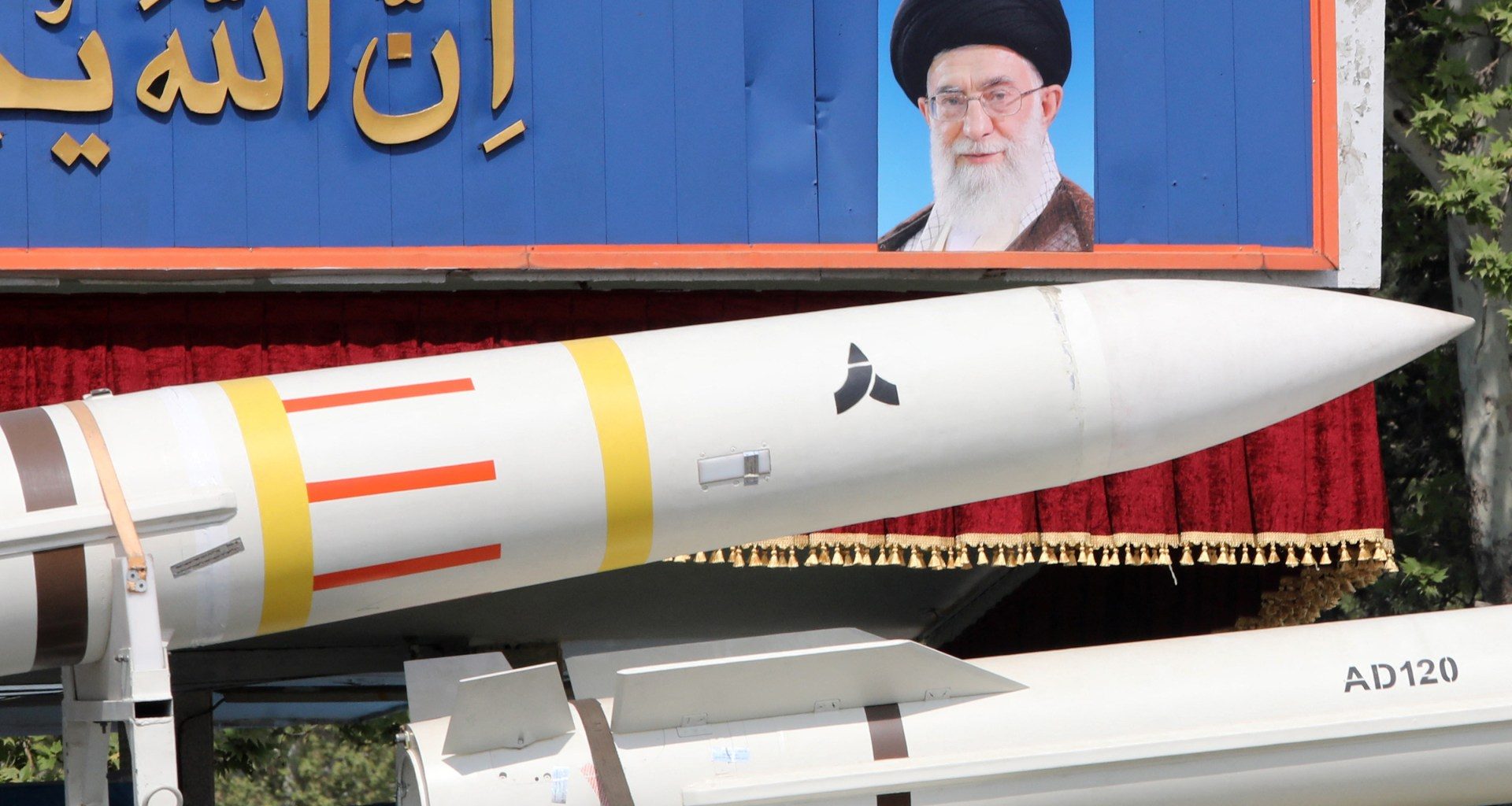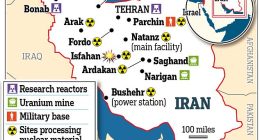
Iranian state media reported on Friday that the country had activated its air defence systems over the central city of Isfahan, to bring down three aerial objects, amid sounds of explosions. Flights were briefly suspended in many parts of the country, before the alert was lifted.
US broadcasters, quoting senior American officials, reported that Israeli missiles had hit Isfahan. Iranian officials said they were still confirming the source of the apparent attack by drones, while Israel has not commented on the incident.
Meanwhile, Syria’s state-owned SANA news agency quoted a military official as saying that missile strikes in the early hours of the morning had damaged air defence sites in the country’s southern region. The report blamed Israel.
The explosions in Isfahan and the attacks in Syria come amid a steady escalation in tensions between the two Middle Eastern nations since Israel began its war on Gaza. While Israel and Iran have been locked in a “shadow war” for decades, recent months have brought tensions to a boiling point — and prompted worries about a wider regional conflict.
Here’s a timeline of that recent escalation since the Gaza war broke out following an October 7 attack on Israel by the Palestinian group Hamas.
October 7: Hamas-led attack on Israel
Hamas launched a surprise attack dubbed Operation Al-Aqsa Flood inside southern Israel. Hours after the attacks, Israel began its bombardment of Gaza, pledging to defeat Hamas but targeting mostly civilians — both through bombs and a tightened siege that has left the enclave on the precipice of a famine. More than 33,000 people have been killed in Gaza since then, mostly women and children.
Iran denied any prior knowledge of the Hamas attack or any involvement in it, but Israel has consistently blamed Iran for its support of the Palestinian group that is a part of the so-called axis of resistance, a Tehran-led n informal alliance of alliance of various players in the region, including Lebanon’s Hezbollah, Yemen’s Houthi rebel groups, the Syrian government, and groups in Iraq. Over the course of its war on Gaza, Israel has come into friction with several groups within the axis.
October 17: Iran warns of ‘preemptive measure’ against Israel
Hezbollah and Israel had been exchanging fire across the Lebanese-Israeli frontier for days when Iranian Foreign Minister Hossein Amirabdollahian told state TV: “Naturally, resistance leaders will not allow the Zionist regime to take any action in Gaza, and when it feels reassured about Gaza, move on to other resistance areas in the region”.
“Therefore, any preemptive measure is imaginable in the coming hours,” he added.
This was a day after Amirabdollahian’s meeting with Hezbollah leader Hassan Nasrallah.
Also on October 17, Iran’s Supreme Leader Ayatollah Ali Khamenei condemned Israel for its war on Gaza and threatened a response.
“If the crimes of the Zionist [Israeli] regime continue, Muslims and resistance forces will become impatient, and no one can stop them,” Khamenei warned. “The bombardment of Gaza must stop immediately.”
November 19: Yemen’s Houthis seize a Red Sea ship
Yemen’s Houthi group, an ally of Iran, seized control of a cargo ship in the southern Red Sea.
Yahya Saree, the Houthi military spokesman said the ship’s seizure was in response to the “heinous acts against our Palestinian brothers in Gaza and the West Bank”.
While the Houthis said the ship was Israeli, Israel said it was a British-owned and Japanese-operated cargo vessel with no Israeli nationals on board.
Since then, the Houthis have consistently targeted ships associated with Israel or the United States in the Red Sea.
December 18: Iran accuses Israel of cyberattack
A cyberattack halted operations of about 70 percent of Iran’s fuel stations.
Iranian state television and Israeli media outlets both reported that Israel-linked group Predatory Sparrow, or Gonjeshke Darande in Persian, was behind the disruption.
December 25: Israeli strike kills top Iranian general in Syria
Iranian state media reported that an Israeli air strike outside the Syrian capital of Damascus killed Sayyed Razi Mousavi, one of the top commanders and senior adviser in Syria of Iran’s Islamic Revolutionary Guard Corps (IRGC).
Mousavi was responsible for coordinating the military alliance between Syria and Iran.
January 15: Iran strikes ‘Mossad centre’ in northern Iraq
The IRGC launched ballistic missiles at what it claimed was an outpost of Israel’s Mossad spy agency in Erbil in the Kurdish region of northern Iraq. At least eight explosions were heard in Erbil, four people were killed and six were wounded.
Almost simultaneously, Iran also struck targets allegedly linked to the ISIL (ISIS) group in northern Syria. The IRGC said it was defending its security and countering “terrorism”.
January 20: Iran accuses Israel of bombing a Damascus building, killing five IRGC members
The IRGC said five of its military advisers were killed in an Israeli air raid on a residential building in Syria’s capital, Damascus.
Syrian state media SANA said that “Israeli aggression” had targeted the building in the Mazzeh neighbourhood.
February 10: Iran warns against a full-scale Israeli attack on Lebanon
Iranian Foreign Minister Amirabdollahian said during a visit to Lebanon that Iran had never sought to expand a war in the region.
However, he warned that any widespread attack by Israel on Lebanon would be Israeli Prime Minister Benjamin Netanyahu’s “last day”.
He added Tehran will continue “its strong support to the resistance in Lebanon, as we consider Lebanon’s security as the security of Iran and the region”.
February 21: Iran blames Israel for gas pipeline explosions
Iran’s principal south-north gas pipeline was attacked twice, disrupting supplies in several provinces.
Iran’s Oil Minister Javad Owji alleged that the “explosion of the gas pipeline was an Israeli plot”.
March 1: IRGC commander, two others killed in suspected Israeli attack in Syria
An attack in the Syrian port city of Baniyas killed an IRGC member and two others.
Iranian state news agency IRNA said Reza Zarei, a member of the IRGC, had been “killed at dawn today by the usurping Zionist regime”.
“Reza Zarei, the man who was killed in Baniyas, was in charge of Iranian oil shipments to Syria. According to analysts, Israel is targeting these high-value targets to cut the link between the command in Tehran and local actors in Syria affiliated to Iran,” reported Al Jazeera’s Zeina Khodr, from Beirut in Lebanon.
April 1: Israel attacks the Iranian consulate in Damascus
The Iranian consulate in Syria’s Damascus was destroyed in a suspected Israeli air strike.
Thirteen people were killed in this strike, including Brigadier General Mohammad Reza Zahedi, a Quds Force senior commander of the IRGC and his deputy General Mohammad Hadi Hajriahimi.
Iranian Foreign Minister Amirabdollahian described the attack “as a violation of all international obligations and conventions” and blamed Israel. Several Iranian officials said that Iran had the right to execute a reaction to the strike.
April 13: IRGC seizes Israel-linked ship near Strait of Hormuz
Iranian armed forces seized the Portugal-flagged MSC Aries near the Strait of Hormuz.
The MSC Aries reportedly departed from a port in the United Arab Emirates en route to India. It is associated with the London-based Zodiac Maritime, a part of the Zodiac Group run by Israeli billionaire Eyal Ofer and his family.
Israeli Foreign Minister Israel Katz wrote in an X post that the move by Iran was “a pirate operation in violation of international law”.
April 13: Iran launches hundreds of missiles, drones at Israel in a first
In an overnight escalation, Iran launched more than 300 drones and missiles against Israel, in an attack that Iran dubbed Operation True Promise. This was the first-ever direct strike on Israel from Iranian soil.
The missiles were largely shot down outside of Israel’s borders with help from the US, the United Kingdom and France, said the Israeli military. Jordan also shot down some of the missiles aimed at Israel as they were flying through Jordanian airspace.
Patients sustained minor injuries and a seven-year-old girl was severely injured by missile fragments.
Read More: World News | Entertainment News | Celeb News
Aljazera








